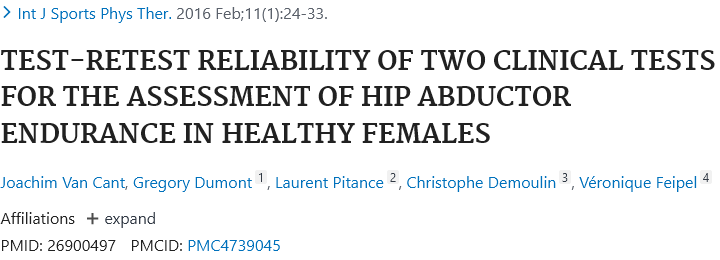
Background: Substantial deficits in performance of hip abductor in patients with common lower extremity injuries are reported in literature. Therefore, assessing hip abductor endurance might be of major importance for clinicians and researchers.
Purposes: The purpose of this study was to examine the test-retest reliability of two hip abductor endurance tests in healthy females. Learning effect, systematic difference in the rate of perceived exertion and relationship between endurance performance and some clinical characteristics of participants were also investigated.
Design: Observational study, with a test-retest design.
Methods: Thirty-six healthy females, aged 18-30 years, were recruited. In two identical assessment sessions, the participants performed an isometric hip abductor strength test and two different hip abductor endurance tests.
Results: Isometric and dynamic endurance tests demonstrated good test-retest reliability (intraclass correlation coefficients (ICC) = 0.73 and 0.78, respectively). The standard errors of measurement (SEM) and the minimal detectable changes (MDC) were, respectively, 19.8 and 54.9 seconds for isometric endurance test and 21.2 and 58.7 repetitions for dynamic endurance test. Moderate correlation between both endurance tests (r = 0.60, p = 0.0001) and weak correlation between dynamic endurance test and strength (r = 0.44, p = 0.008) were found.
Conclusions: The results of the present study demonstrate good test-retest reliability of two non-instrumented clinical tests of hip abductor endurance in healthy females.
